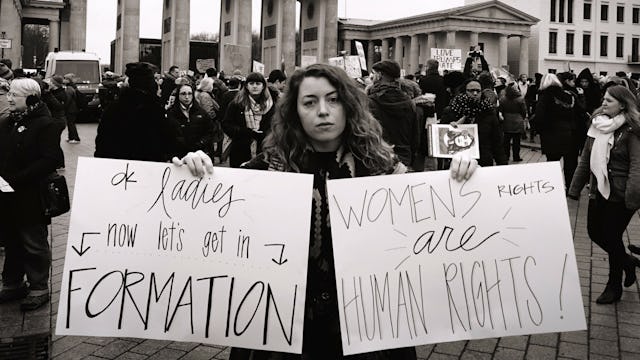Let’s NOT Go Back To 'Back Alley' Abortion Days, Please

One more time, for the people in the back: pro-choice is not the same thing as “pro-abortion.” Pro-choice means that we believe abortion is part of women’s reproductive rights and that no woman should be forced to carry a child to term against her will.
Last week was the 45th anniversary of Roe v. Wade, the 7–2 Supreme Court decision that affirmed a woman’s right to have an abortion under the 14th Amendment. It was a landmark decision that saved women’s lives.
The vast majority of Americans oppose overturning Roe v. Wade and say abortion should be legal in all or most cases. I personally believe abortion is one of the most personal and complex decisions a woman will ever have to make. I certainly don’t believe the government should ever be able to dictate what a woman does or doesn’t do with her body.
But in South Dakota, a state where every branch of the state government is pro-life, they’re attempting to do just that. There is only one remaining healthcare clinic offering abortion in the state: Sioux Falls Planned Parenthood.
Women who get an abortion in South Dakota must make two trips to this one remaining clinic, no matter how far away they live. And their visits must be longer than 72 hours apart, which is the longest waiting period in the country. They must do this because state legislators think women need three days to really think about their decision and “make good choices,” according to South Dakota Governor Dennis Daugaard.
And this clinic must adhere to absurd procedures the state legislature has put in place, such as telling women that suicide is a possible medical risk associated with abortion.
Wildfang, a Portland-based feminist apparel company, wants to help save the Sioux Falls Planned Parenthood from closing. Last week they launched a Indiegogo campaign for the clinic, which has so far raised over $85,000 of their original $50,000 goal. (They have since updated their goal to $750,000, which would fund the Sioux Falls Planned Parenthood for one full year.)
“South Dakota has only one clinic left that offers abortion services and it’s under threat every day,” said Wildfang CEO Emma Mcilroy.
“The doctors and nurses who work there face hostility on a daily basis, the state legislature is firmly [against] a woman’s right to choose and has repeatedly try to shut down this clinic, and 35 percent of women who use the clinic travel 300 or more miles to get there.”
It’s insulting that women aren’t able to make these decisions for themselves. How is it that it has been almost 50 years since Roe v. Wade and seven states have just one abortion clinic?
Some women, such as Senator Elizabeth Warren, remember what the days of “back alley” abortions were like:
“I lived in a world of back alley butchers and wrecked lives. We’re not going back — not now, not ever,” said Warren in a recent op-ed for Time.
“Abortion rights are under threat across the country, as anti-choice politicians push for policies that restrict women’s access to abortion services,” she wrote. “And it’s not just abortion rights. Services that would help women prevent unplanned pregnancies, or care for children after having them, are at risk. Affordable health care, accessible contraceptives and other programs that support working women and families are on the line, too.”
Women’s health decisions should be made between women and their doctors alone. We’ve come too far to go back to the days where women are forced to put their own lives at risk.
“When making policy about women’s bodies, government officials should trust the women whose lives and futures are on the line. Safety and economic security — that’s what Roe v. Wade is still all about.”
Let’s not go back to those back alley pre-Roe days. Not now, not ever.